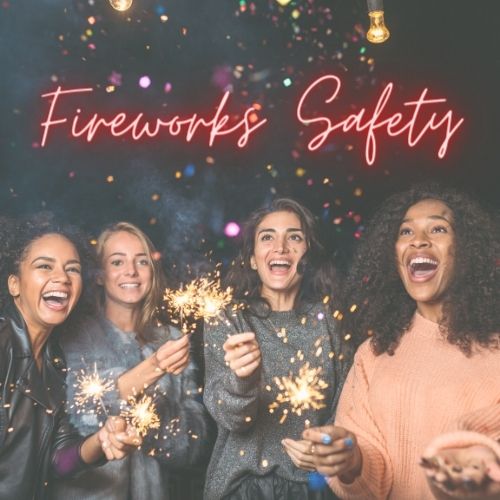Fireworks Safety to Prevent Eye Injuries


Fireworks safety prevents burns and eye injuries from fireworks.
This is the time of year for fireworks and firework shows. But it is also the time of year when eye injuries and burns from fireworks send many people to the emergency room. If you are going to set off fireworks, keep yourself and your family safe by following the safety rules listed at the end of this article.
Injuries at professional fireworks shows are uncommon. Most injuries caused by fireworks are the result of misuse by consumers.
Common mistakes people make when using fireworks are improperly lighting the fireworks, lighting fireworks while holding them, or holding them too close to other people.
According to the US Consumer Product Safety Commission 2019 Fireworks Annual Report, fireworks were involved with an estimated 10,000 injuries treated in U.S. hospital emergency departments during the calendar year 2019 and fireworks use resulted in 12 deaths.
Sparklers Can be Dangerous
Even sparklers can be dangerous because they burn at more than 2,000 degrees Fahrenheit. Sparklers can catch clothing on fire and cause severe burns. There were an estimated 900 emergency department-treated injuries associated with sparklers.
Some firework injury statistics from the US Consumer Product Safety Commission’s 2019 Fireworks Annual Report:
- Fifty-eight percent of the emergency department-treated injuries were burns. Burns were the most common injury to hands, fingers, arms, and legs.
- Approximately 87 percent of the victims were treated at a hospital emergency department and then released.
- An estimated 13 percent of patients were treated and transferred to another hospital, or admitted to the hospital.
Do’s and Dont’s in Case of Eye Fireworks Eye Injury
An eye injury from fireworks combines blunt force trauma, heat burns, and chemical exposure and is a medical emergency.
- Seek medical attention immediately.
- Do not rub your eyes.
- Do not rinse your eyes.
- Do not apply pressure to your eyes.
- Do not remove any objects that are stuck in your eye. You could further injure your eye.
- Do not apply any ointments or take any blood-thinning pain medications such as aspirin or ibuprofen.
Fireworks Safety Tips
Attend only public fireworks displays put on by trained professionals and stay back at least 500 feet from the display.
Do not pick up fireworks that may be left over after the display. Fireworks that may have been ignited but failed to explode can still be active.
IF YOU USE FIREWORKS FOLLOW THESE SAFETY RULES
- The following safety tips are from the U.S. Consumer Product Safety Commission:
- Never allow young children to play with or ignite fireworks.
- Avoid buying fireworks that are packaged in brown paper because this is often a sign that the fireworks were made for professional displays and that they could pose a danger to consumers.
- Always have an adult supervise fireworks activities.
- Never place any part of your body directly over a fireworks device when lighting the fuse.
- Back up to a safe distance immediately after lighting fireworks.
- Never try to re-light or pick up fireworks that have not ignited fully.
- Never point or throw fireworks at another person.
- Keep a bucket of water or a garden hose handy in case of fire or other mishap.
- Light fireworks one at a time, then move back quickly.
- Never carry fireworks in a pocket or shoot them off in metal or glass containers.
- After fireworks complete their burning, douse the spent devices with plenty of water from a bucket or hose before discarding to prevent a trash fire.
- Make sure fireworks are legal in your area before buying or using them.
If you would like to make an appointment, call us 609.877.2800 or EMail us.
Gregory Scimeca, M.D.
Ophthalmologist and Medical Director
The Eye Professionals
Our Locations
